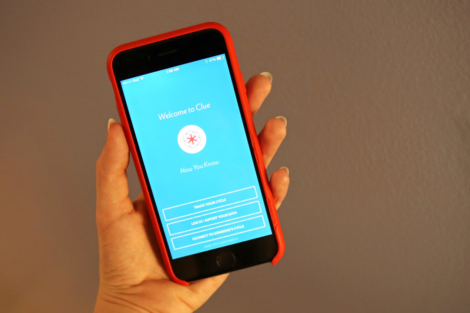men·stru·a·tion
noun
the process in a woman or person with a vagina of discharging blood and other materials from the lining of the uterus at intervals of about one lunar month from puberty until menopause, except during pregnancy.
I started using the period tracker Clue about a year ago when my cycle became irregular and I had no idea what the hell was going on with my body.
For those of you who may be wondering what exactly a period tracker is and why anyone would want to use one, well, this one’s for you. And to those of you who are considering clicking away from this article because the word ‘menstruation’ makes you uncomfortable, well, surprise! We bleed.
Period tracking apps are exactly what they sound like: They are apps that use inputted information about your cycle — such as pain levels, bleeding, emotions, sleep, sexual activity or lack thereof, energy, mental health, and more — to keep track of upcoming periods, evaluate menstrual health, and basically let you know why you’re suddenly craving a tub of Ben & Jerry’s Vanilla Caramel Fudge at 2:30 in the afternoon on a Wednesday.
Out of the abundance of apps that can be found in the app store, I chose Clue because of the simplicity of its layout, its high ratings, and the lack of stereotypical pink flowery designs that are found on most tracking apps.
After a few cycles passed, I found that Clue could predict my period almost to the day. This may not be the case for everyone — some periods are more irregular than others — but trackers are a great way of getting more in touch with your body and what’s going on inside of it.

First, period tracking apps are an excellent way to help identify how your menstrual cycle affects and is affected by changes to your body, from medical treatments like hormone replacement therapy to emotional states including dysphoria.
But that’s not all. Moving outside of our own bodies, Clue has a feature where you can share your cycle and symptoms with people in your contacts. At first, I wondered why anyone would want to share such personal information. However, I’ve found that it’s features like this — and the apps that feature them — that are changing how we see menstruation and how it affects our bodies.
Simply telling someone, ‘Hey, this is what’s going on in my body right now’ normalizes periods and sparks conversations about them.
Often, people assume that only women use period tracking apps. Specifically, cisgender women — women who have always identified as such and were born with the genitalia to match. Of course, this makes sense considering the fact that we’ve been raised to think that only women have vaginas and only men have penises and those are the only two options available. But, realistically, the world isn’t so binary.
As a cis woman, I obviously can’t speak to the individual struggles that trans and/or non-binary people experience when it comes to periods, but I have learnt that just acknowledging the fact that it’s not just cis women who get periods changes the way we see menstruation. It helps to deconstruct the idea that menstruation is limited to one type of body.
However, in addition to the types of bodies that are affected by menstruation, it’s important to discuss the North Atlantic centrism of these kinds of technologies and apps such as Clue.
These apps are excellent resources for privileged individuals, but what about the millions of people across the globe who don’t even have access to basic menstrual products?
We can applaud these apps and the people making them for opening discourse, but we also need to start conversations surrounding the accessibility of menstrual hygiene products for everyone.
We need to demand more.
We also need to be critical of the apps we are downloading. What are the main reasons that developers are putting these apps on the market? Do these companies actually care who uses their services and why?
Developers of these applications are capitalizing off of menstruation while much of the world still sees it as a taboo topic. We may have gotten rid of the tampon tax here, but we are still paying for menstrual products, as if bleeding from our vaginas once a month is some kind of luxury.
We have to pay to keep our bodies clean and download apps to keep track of our bodies. Money is still being made off of bodies that have no say in their function. Looking into the goals and priorities of the companies making these applications is just as important as talking about the people benefitting from them.
Ultimately, period tracking apps and the people making them should be focusing on advancing reproductive and menstrual health care, not restricting it to a specific group of people. Everybody and every type of body needs to have equal access to these products and services.
This, of course, may seem like an unrealistic goal to have considering all the variables that come into play, including location and means, but I hope that articles like this can start dialogue that will take us one step further in the right direction.


